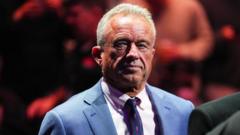Demonstrating controversial views and ambitious goals, Robert F. Kennedy Jr. plans to challenge Big Food and promote healthier eating in America.
**Revamping America's Diet: RFK Jr.'s Mission Against Ultra-Processed Foods**

**Revamping America's Diet: RFK Jr.'s Mission Against Ultra-Processed Foods**
RFK Jr. targets food reform to combat health issues linked to junk food and additives.
Robert F. Kennedy Jr. is committed to transforming American dietary habits, focusing on a significant reduction in ultra-processed foods, unhealthy food dyes, and additives. As President-elect Donald Trump's nominee to head the Department of Health and Human Services (DHHS), Kennedy argues that corporate food industries are compromising public health, stating, “We are betraying our children by letting [food] industries poison them.”
Kennedy's announcement comes after he ended his independent presidential campaign, aligning instead with Trump's vision. However, experts like former NYU nutrition professor Marion Nestle caution that Kennedy will face substantial obstacles in reforming the food industry, including pushback from Big Food. His controversial history, including unfounded claims about vaccines, raises questions about his credibility and ability to implement effective changes.
Regardless, some of Kennedy’s initiatives resonate with health experts and lawmakers, with Colorado Democratic Governor Jared Polis acknowledging the importance of shaking up both the DHHS and the FDA. Noteworthy is Kennedy's mantra “Make America Healthy Again,” which advocates for the elimination of ultra-processed foods that contribute to serious health issues, such as obesity and diabetes. He specifically highlights toxic ingredients in school lunches and believes current food safety regulations are inadequate.
Kennedy's approach includes a reevaluation of the FDA, which oversees food safety, and he has pledged to remove individuals he deems part of a “corrupt system.” He has expressed intentions to eliminate certain additives and dyes—such as Red No. 3, already banned in California. Nonetheless, some of his proposals, like banning fluoride and raw milk consumption, have drawn skepticism from health experts who cite potential health risks and lack of evidence in support of his claims.
The complexity of reforming food safety regulations remains a significant hurdle for Kennedy. Former FDA officials note that both the Department of Agriculture and FDA share oversight responsibilities, and such sweeping changes will be met with industry resistance. Calls for dialogue on the nature of ultra-processed foods have been echoed by advocacy groups and public health experts, although Kennedy's spirited rhetoric may overshadow the realities of the regulatory process.
While public health experts find merit in addressing ultra-processed food consumption, they warn of the challenges ahead, emphasizing that Kennedy's approach must be grounded in factual evidence to truly enhance America's diet. With significant discussions on dietary guidelines and food safety on the horizon, the landscape of America's food choices could undergo distinct transformations, depending on Kennedy's leadership.



















